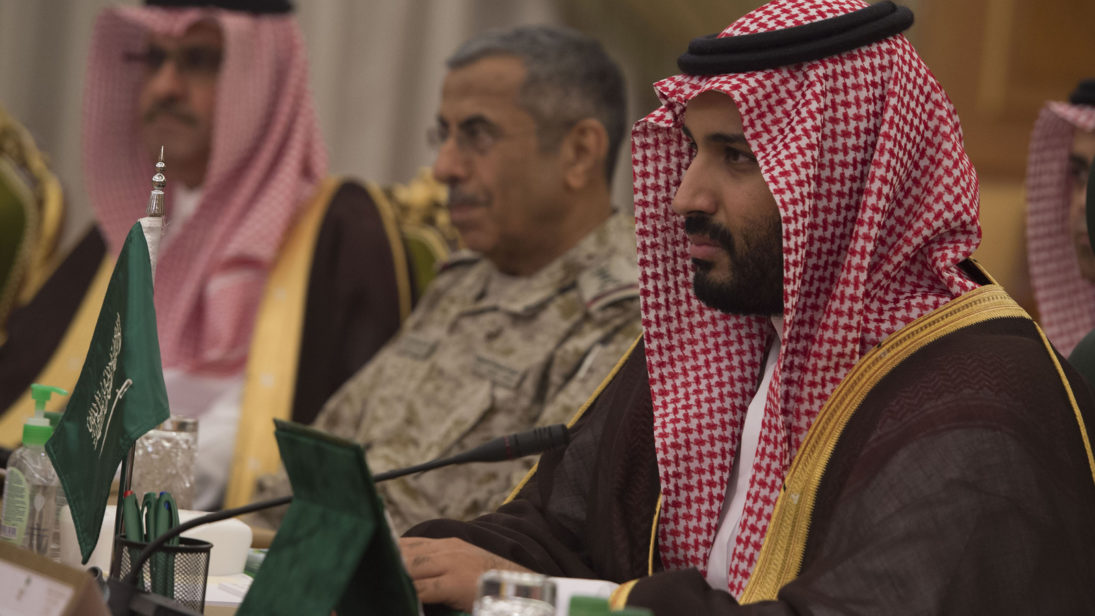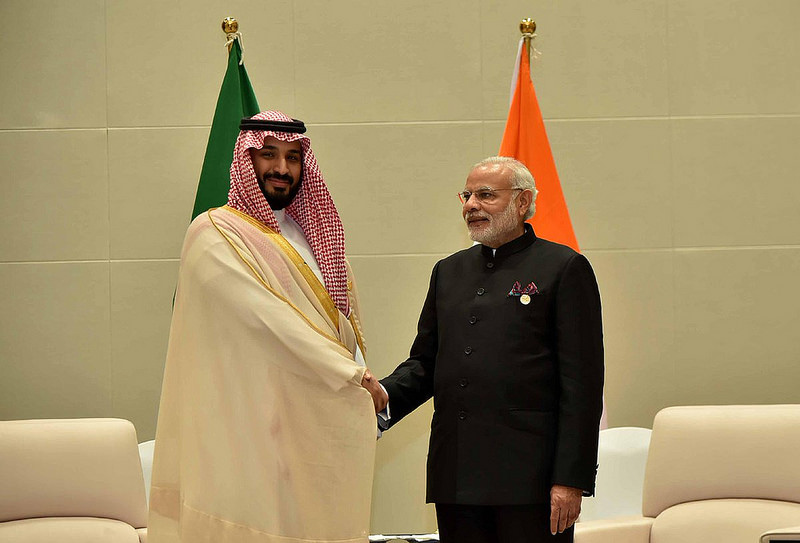
The bonhomie between India and Saudi Arabia over the last few years, on display most recently during Indian Foreign Minister Sushma Swaraj’s visit to Riyadh last month, has raised eyebrows in Pakistan. Islamabad has traditionally enjoyed close cultural and religious ties with Riyadh and received immense diplomatic and economic support from the Kingdom over the years. Recently, though, India and Saudi Arabia have broadened the scope of their relationship, no longer encompassing only energy but infrastructure development and defense & security as well. However, Pakistan has no reason to worry—while Riyadh-New Delhi ties are more transactional, being primarily driven by economics, Saudi Arabia’s relationship with Islamabad is more strategic, based on shared values and geopolitical interests.
Burgeoning India-Saudi Arabia Ties
The Kingdom’s economic relationship with India is driven principally by its goal of steering its economy away from dependence on oil and implementing a more Western-style market economy system. In April 2016, Saudi Arabia unveiled a document known as Vision 2030, outlining how the Saudi government will achieve this goal by marketing its public assets, reinvesting and remapping its funds, and raising revenue through new channels. The country even tried to leverage its oil reserves in an attempt to end its reliance on it. However, almost two years in, Saudi Arabia hasn’t achieved much, with Saudi Aramco’s public offering still not out and oil supplies being kept well below the Organization of the Petroleum Exporting Countries (OPEC) limit in order to increase prices. Crown Prince Mohammad bin Salman’s travelogue over the past year (Russia, Japan, the United Kingdom and now the United States) has primarily focused on how to successfully implement his grand plan through several trade agreements.
However, more needs to be done for Vision 2030 to succeed, and Saudi Arabia seems to consider India’s rapidly growing economy as part of the answer. For instance, Riyadh and New Delhi’s growing relationship is signified by the fact that India is Saudi Arabia’s fourth largest export market as per 2016 data, with India accounting for 9.3 percent of its share of global exports. Meanwhile, Saudi Arabia is India’s fourth largest trading partner, with their bilateral trade amounting to $25.08 billion in 2016-17 and in 2017, Saudi Arabia was the second-largest supplier of crude oil to India. Additionally, as stated earlier, the relationship has moved beyond energy to include areas such as infrastructure: for example, Indian infrastructure company Larsen and Toubro won a contract worth $1.4 billion to build the railway track for Riyadh’s metro project.

In terms of diplomatic and security engagement, India-Saudi Arabia relations have been on the upswing since former Prime Minister Manmohan Singh’s visit to Riyadh in 2010, the first Indian prime minister to do so since Indira Gandhi in 1982. The 2010 visit was marked by the beginning of counterterrorism cooperation through the signing of the bilateral extradition treaty. Ties were elevated further after Indian Prime Minister Modi’s visit to the country in April 2016 when the two countries announced the signing of various agreements related to intelligence sharing on money laundering and terror financing in the Af-Pak region. Recently, Saudi Arabia gave Air India the go-ahead to utilize its airspace for flights between New Delhi and Tel Aviv, which is significant considering Riyadh does not recognize Israel as a legitimate state. However, cooperation in the defense and security arena has moved slowly and is still underdeveloped, and more importantly, it is dwarfed by the decades-long, close security partnership that Pakistan and Saudi Arabia enjoy.
Saudi Arabia and Pakistan: Traditional Allies
The India-Saudi Arabia relationship may have made rapid strides in recent years, but Riyadh’s ties with Islamabad are much older, deeper, and consequential. Firstly, relations between the two countries are firmly grounded on their shared religious values. Secondly, Saudi Arabia and Pakistan have a decades-long and rich history of military and intelligence cooperation, with Riyadh having relied on the Pakistani military on various occasions. For instance, Pakistan Air Force pilots fought on behalf of the Kingdom and defended its territory against a South Yemeni attack in 1969 while Pakistani soldiers have been deployed to Saudi Arabia various times since the 1960s. In return, Pakistan has received significant Saudi loans and economic assistance in times of crises: Saudi Arabia provided 50,000 barrels of free oil per day to Pakistan when it was reeling from sanctions after its 1998 nuclear weapons tests. More recently, in 2014, Riyadh loaned Islamabad $1.5 billion to shore up its foreign currency reserves. Thus, both countries have stood defiantly by each other in times of need.
Though the relationship took a dip in 2015 when, despite Saudi Arabia’s request, Pakistan refused to send troops to Yemen to help oust the Houthi rebels, Islamabad partially reversed that decision recently, most likely in a bid to placate Riyadh. Additionally, the head of the Saudi-led Islamic Military Counterterrorism Alliance is none other than the former Pakistan Army chief General Raheel Sharif, highlighting the continued strategic partnership between the two countries.
Saudi Arabia’s Approach to South Asia
Increasing India-Saudi Arabia closeness is likely to make Pakistan uneasy but it is important to understand that even allies may need to look outside traditional partnerships to advance certain interests. Thus, as Saudi Arabia tries to implement its Vision 2030, it may partner with India to achieve its economic objectives. But that cannot impact its unique alliance relationship with Pakistan, which has reiterated its commitment to the Kingdom’s territorial integrity several times, including during the recent ballistic missile attack on Saudi Arabia. Perhaps Pakistan too has begun to understand the value of this Saudi approach, considering its recent push to strengthen ties with Iran.
***
Image 1: James N. Mattis via Flickr
Image 2: Narendra Modi via Flickr


